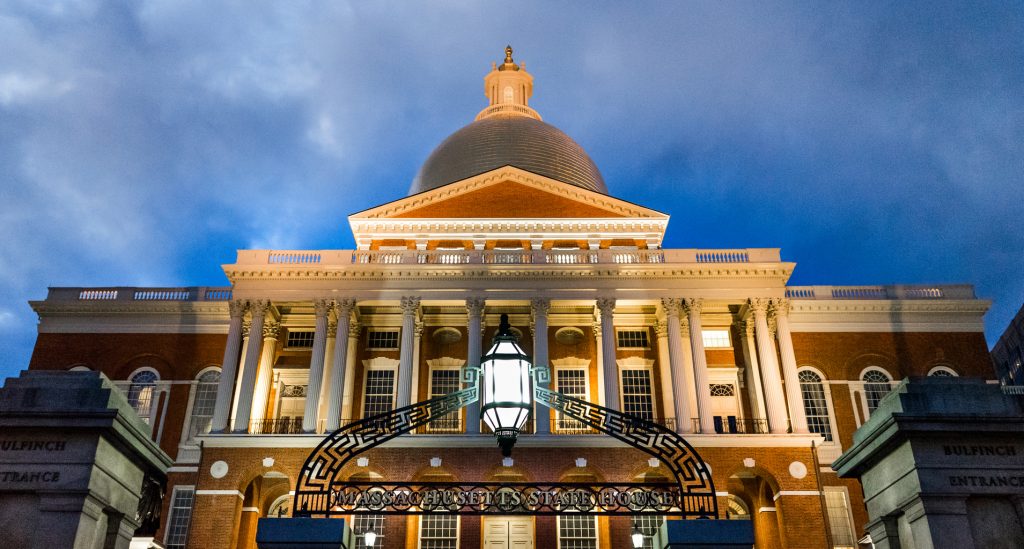Budget amendment will promote more open space protections

BOSTON – House Minority Leader Bradley H. Jones, Jr. (R-North Reading) and State Representative Richard M. Haggerty (D-Woburn) were part of a successful bipartisan effort to secure language in the proposed Fiscal Year 2022 House budget that will help preserve open space in Massachusetts by raising the annual cap on the state’s Conservation Land Tax Credit.
The amendment, filed by Jones and co-sponsored by Haggerty and 52 of their House colleagues, passed the House of Representatives on a unanimous roll call vote of 160-0 on April 26, the first day of debate on the budget. The amendment language closely mirrors House Bill 2960, a stand-alone bill that Jones filed with Representative Smitty Pignatelli (D-Lenox), who also co-sponsored the amendment.
Since 2011, the Conservation Land Tax Credit has provided a financial incentive for individuals to donate land in Massachusetts to a public or private conservation agency so the land can be preserved as open space in perpetuity. Jones’ amendment calls for a temporary increase in the program’s annual cap, which would rise from $2 million to $5 million over a three-year period beginning on January 1, 2022, with the cap increase remaining in place until December 31, 2031.
“The recent passage of the 2050 Roadmap bill recognized that naturally occurring carbon sequestration is a very important component of the state’s ability to reach its short and long-term goals for reducing carbon emissions,” said Jones. “Increasing the tax credit program’s annual cap will help to clear up the backlog of projects that are currently pending and will reap significant environmental benefits for the Commonwealth.”
“This land tax credit goes a long way in protecting our natural resources by encouraging landowners to permanently conserve land in the Commonwealth,” said Haggerty. “I was so proud to support this effort that will increase the amount of land we are able to conserve, protect more wildlife, and naturally combat global warming. We have a responsibility to future generations to preserve our planet and the resources we all enjoy.”
“We are thrilled to see the House unanimously adopt Leader Jones’ bipartisan amendment to increase the annual cap on the Conservation Land Tax Credit. This successful program has led to the conservation of nearly 14,000 acres across the state and is one of the most cost effective tools we have to conserve working farms and forests, wildlife habitat, drinking water supply lands, and natural carbon stores,” said Deb Markowitz, state director of the Nature Conservancy in Massachusetts.
The Conservation Land Tax Credit provides qualifying applicants with a refundable state tax credit equal to 50 percent of the fair market value of the donated property, up to a maximum credit of $75,000. The tax credit is reserved for land with significant conservation value, including forest land, farm land, land used for wildlife protection, and projects essential to water quality protection.
As of January of 2021, a total of $18.38 million in tax credits have been awarded to 350 projects, resulting in the permanent protection of nearly 14,000 acres of land valued at over $76.5 million.
Jones and Haggerty noted that $2 million in tax credits have already been committed this year to 33 projects that will protect about 1,954 additional acres, but another 83 projects remain pending due to the annual cap restrictions, with some of the projects expected to be waiting until at least 2024 for the tax credit. Those 83 projects represent another 1,482 acres of land targeted for conservation.
More than a dozen environmental organizations have endorsed the proposed cap increase, including The Nature Conservancy, the Massachusetts Land Trust Coalition, Mass Audubon, and the Environmental League of Massachusetts.
This marks the fifth budget cycle since Fiscal Year 2016 that the House has gone on record in support of raising the cap. Jones and Haggerty said they are hopeful the Senate will follow suit when it debates its own version of the Fiscal Year 2022 budget in May
